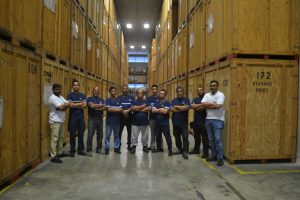Singapore — At The Independent Singapore, we are doing a series of interviews about how the current ‘Circuit Breaker,’ (the restrictions imposed to curb the spread of Covid-19) affects people from all over the country, from business owners to property agents to home cooks to sales staff. We want to know how these restrictions have affected their lives, work, relationships, and what they see for the future.


This interview has been lightly edited for clarity.
Tell us a bit more about your business and how things have changed due to the Circuit Breaker, and eventually the tighter measures?
Prospect Logistics Pte Ltd is a fourth-party logistics company that renders freight forwarding, container haulage, local transportation, and warehousing services. Our core business is in supporting international relocation, fast-moving consumer goods (FMCG) and e-commerce industries. Our largest proportion of revenue comes from serving international relocation companies.
Due to the Covid-19 Circuit Breaker measures, business from international relocation companies has fallen beyond sustainable levels despite our having exclusive sales agreements with several of them. This is largely due to Stay Home Orders and quarantine requirements at both origin and destination countries.
On the other hand, we’ve seen a significant increase in demand for our services in FMCG and e-commerce industries. Even though we suffered huge losses in February and March, we’ve been fortunate enough to divert most of our resources to serve FMCG and e-commerce industries.
This has cut our losses significantly but with the tighter measures being imposed, our options have become further limited, especially for our warehousing division.
What are the two greatest challenges you have faced during this period?
Like every business, managing company finances and cash flow have been our utmost concern. Due to the drop in revenue for businesses in most sectors, a climate of financial sensitivity has emerged where even if companies possess sufficient funds, they tend to hold off releasing large amounts in one go, likely due to the uncertainty that all business owners are facing regardless of size. Consequently, customers are paying us much later than the due date.
Government schemes such as the Wage Credit Scheme and Job Support Scheme have been absolutely crucial in keeping our business alive.
A month ago, the Directors and our Finance team were devastated due to delays in collecting payments, and we were on the verge of delaying mid-month salaries for our operations staff for the first time. But that very morning, the Job Support Scheme funds were credited. This spared us our dignity and our workers hardship. This experience has taught us to never fully draw down on our trade facilities so as to maintain reserves for unforeseen circumstances.
Secondly, it has been extremely challenging having the management and finance team working from home. Being an operations-based service provider, no one day is the same as another. When our managers are working from home, they take longer to troubleshoot an operational hiccup than when they are onsite, due to over-reliance on half-truths being fed to them and longer time taken to communicate with other departmental managers.
The matters we tend to think require our least attention sometimes end up being a major disruption. When we got our Finance team to work from home, they spent the first week being unable to access the accounting software due to server issues. This resulted in us invoicing our customers later than usual, which in turn delays collection of payment. This serves as a stark reminder of the importance for businesses to keep up with technology.
When the Circuit Breaker eventually ends, do you see things picking up? If not, what comes next?
We expect international relocation to remain dull for several months even after the Circuit Breaker comes to an end. A sentiment of fear may linger and people will choose to stay within their comfort zone. Also, even though there might be a temporary boost in revenue for retail outlets, to succeed in the long term, retailers will be forced to establish a greater presence online.
During this Circuit Breaker period, everyone, regardless of technological prowess, has been forced to order online. This is a game-changer for FMCG and e-commerce industries, as it could very likely be a possibility that many continue to order online even after the circuit breaker. This will definitely create a greater demand for reliable and experienced last-mile fulfillment providers. The key is to be versatile and informed of market trends so we can position ourselves at the right place at the right time.


They are all working harder than ever and most of them have been fully supportive of even the difficult decisions our Management has been forced to make.
However, we do sense an atmosphere of restlessness. This is probably because without doing the activities they enjoy and those that help them destress, they return to work without feeling rejuvenated.
Have you had to lay off anyone? How did you cope with that?
At the beginning of March 2020, we implemented a ten percent salary reduction across all employees including the Directors as phase 1 of our cost-cutting measures. Prior to that, the Directors drew up a list of cost-cutting measures that involved four phases. Phase 3 and phase 4 involved laying off staff.
Fortunately, we do not see the need to extend beyond phase 1 of cost-cutting measures, and, in fact, the Directors are now working out a budget to explore reinstating the salary reduction imposed on our operations team only. Now that our operations team has been diverted to fully serving the FMCG and e-commerce industries, it is not fair for them to continue working even harder than before but with a salary reduction.
One management staff’s role was made redundant due to the decrease in business from international relocation companies. We are currently in discussion with Workforce Singapore (WSG) to tap on their redeployment support programmes, which offers Salary Support for up to six months to reskill and redeploy that affected staff to perform the new Business Development role for us.
What would you say to fellow Singaporean business owners out there?
We are a relatively young company without much reserves or deep pockets, and there are many local entrepreneurs like us facing similar or even more onerous commitments which they are struggling to fulfil. It honestly pays (literally and figuratively) to spend a day or two going through all the schemes that the government has come up with. Initiatives such as temporary manpower arrangements under WSG can help companies manage the costs incurred from excess workers during this trying period.


Alternatively, speak to your customers and explore the possibility of price reduction in exchange for faster turnaround on payment. This could help to sustain overheads at least until loan applications come through. —/TISG

